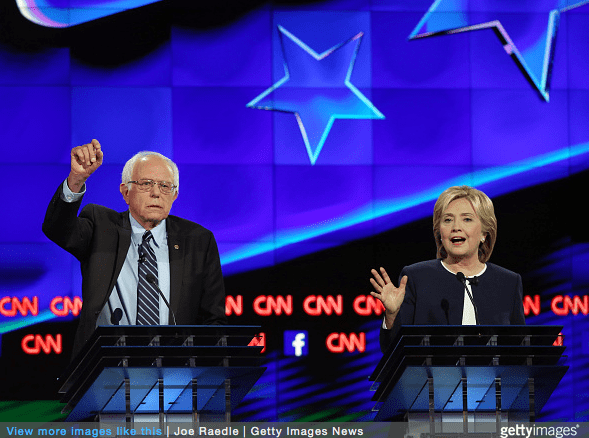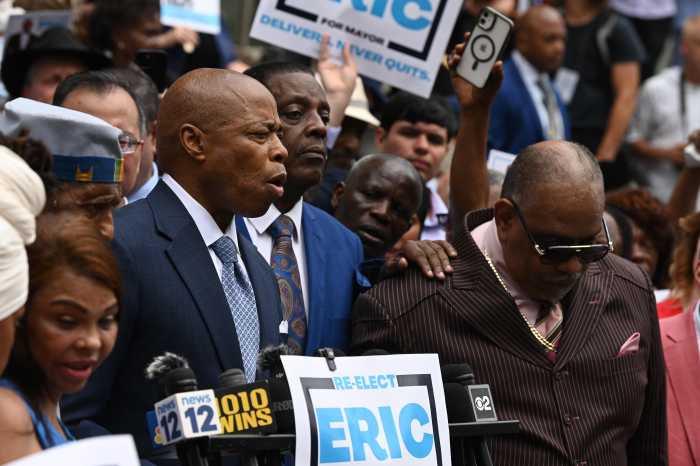As the Mets were striking out in Queens Tuesday night, the five top Democrats running for president were hitting all the issues in Las Vegas.
The clear winner, when the game, or rather the debate was over, had to be former Secretary of State Hillary Clinton. Even Donald Trump thought so, judging by his tweet: “In all fairness, like her or not, she did her job.” In other words, he probably wouldn’t have fired her. The Washington Post pundit Dana Milbank observed that though she may have been notably shorter than her rivals, “she towered over them.”
Clinton had center stage at the ballroom at the Wynn hotel, owned by billionaire Steve Wynn. To her left stood ex-Maryland Gov. Martin O’Malley and ex-Rhode Island Gov. Lincoln Chafee. On her right were Vermont Sen. Bernie Sanders and former Virginia Sen. Jim Webb, who served in the Reagan administration as secretary of the Navy. In all, the senators had a 3-to-2 advantage over the governors, considering that New Yorkers elected Clinton to the Senate after she’d been First Lady.
Speaking of the White House, the apparent loser would have to be Vice President Joe Biden, whose podium was ready back stage in case he decided at the last minute to fly to Vegas. Biden’s undiminished popularity, especially after he had to endure the recent tragic death of his son Beau, has led a crew of Democrats with deep pockets to fund a Draft Biden super-PAC, who have pointed to the steadily diminishing popularity of Clinton, the frontrunner.
But the dynamics of the Democratic nomination may have shifted so much from the Tuesday night debate that Biden may have lost the opportunity to make a difference in the race, assuming he would even want to run, and his statements on that have been more enigmatic than pronouncements from the oracle at Delphi. By most accounts, his support would come at the expense of Clinton, raising the chances that the “Democratic Socialist” from Vermont would get the nomination. Whether Sanders could win the general election is the billion-dollar question.
Clinton seemed to relish the spotlight, and nothing the men said knocked her off stride. Her supporters, no doubt reeling from the bad press spilling out this summer about the way the former Secretary of State had mishandled her private email server, could let out a huge sigh of relief. Congressional Republicans have spent more than $4 million on their Benghazi committee that was first investigating the death of the American ambassador in Libya and shifted its focus to Clinton’s private emails. House Majority Leader Kevin McCarthy let the cat out of the bag when he admitted that the purpose of the ongoing investigation has been to knock down her poll numbers and raise the public’s doubts about her trustworthiness. On the campaign trail she’s mishandled her explanations; even her apology sounded false. At the Wynn hotel, she came off more polished in her response.
But she got an unexpected lift from Sanders at the expense of Anderson Cooper, whose role as media attack dog hit a snag when her Vermont rival refused to take the bait.
“Let me say something that may not be great politics, but I think the secretary is right—and that is that the American people are sick and tired of hearing about your damn emails,” Sanders said. The audience cheered wildly. Clinton reached out and shook his hand. “Thank you!” she said, adding, “Me, too! Me, too!” Sanders’ comment resonated so widely because he not only hit the nail on the head, but he also pinpointed something else the American people are sick and tired of hearing: rabid politicians who substitute venom for intelligent discourse.
Cooper had torn into Sanders, too, describing a hypothetical Republican attack ad against him in lurid terms: Saying he’d supported the Sandinistas in Nicaragua and gone honeymooning in the Soviet Union. As some of us recall, the Sandinistas were very popular among the American left before they came to power in Managua and for a few years afterwards until they were voted out. Sanders and his second wife had indeed gone to Yaroslavl, the sister city of Burlington, because he was mayor at the time.
To Sanders’ credit he gave a credible defense of what he means when he calls himself a Democratic socialist as opposed to being a capitalist: “Do I consider myself part of the casino capitalist process by which so few have so much and so many have so little, by which Wall Street’s greed and recklessness wrecked this economy? No, I don’t.” And in response to a statement from Clinton about how she’d crack down on Wall Street wrongdoers, he retorted, “Congress does not regulate Wall Street. Wall Street regulates Congress.”
Sanders and Clinton did differ on gun control, and she criticized the senator for opposing legislation imposing penalties on gun manufacturers—a position favored by the National Rifle Association—that she supported when she was also on Capitol Hill. In their televised clash over the issue Tuesday night, she came out on top. When Sanders mentioned how a democratic socialist government like Denmark provided better public services to their citizens than Americans get, she rebutted him without getting personal: “We are not Denmark—I love Denmark—we are the United States.” And she went to praise our economic system for creating “the greatest middle class in the history of the world.” She agreed with him that “it’s our job to rein in the excesses of capitalism so that it doesn’t run amok and doesn’t cause the kind of inequities we’re seeing in our economic system.” In a battle of soundbites, saving the middle class probably trumps defending Denmark when it comes to connecting with general election voters.
But here is where Sanders did succeed in front of a national audience. By putting the other four candidates in the position of trying – and failing – to defend capitalism in opposition to the broad moral value of Sanders’ socialist vision, he changed the discourse that has shaped progressive politics for decades. He is taking back the word “socialist,” a label that has been so poisonous that the Republicans relied almost solely on its power to slander President Obama (falsely) and sabotage both of his presidential campaigns (unsuccessfully). By defining it in public, Sanders took back ownership of the word and can now harness its power for the good of the left. Now if he could only set his sights on the word “liberal.”
As for the other three guys on stage, Andy Borowitz, the best-selling humor author and New Yorker contributor, had a good line, saying that by a wide margin polls showed that viewers wanted these men removed from the debate.
Martin O’Malley got points for being the handsomest guy on stage, but his record as Maryland governor and Baltimore mayor was not so hot. His current criticism of Clinton rang hollow when she thanked him warmly for supporting her in the 2008 primary race.
Lincoln Chafee did himself no favors when he fumbled his attempts to sound more ethical than Clinton and admitted that he had no clue what he was doing when he cast his first vote as senator to repeal the Depression-era Glass-Steagall act in 1999. He told Cooper, who pressed the point, that the moderator was “being a little rough.”
Given his stiff demeanor at his podium, Jim Webb looked like he was waiting for someone offstage to yell, “At ease!” He didn’t help his cause by whining over how little attention he was getting compared to Sanders and Clinton. On the other hand, when he answered Cooper’s sophomoric question about whom they’d be proud to put on their enemies list, he showed his military mettle without any pussy-footing around: “I’d have to say the enemy soldier that threw the grenade that wounded me, but he’s not around right now to talk to.”
When it came to substance, all the candidates on stage had something meaningful to say, but what Sanders and Clinton said carried the most weight, in part because they represent the best the Democratic Party has to offer, at least right now.
In one telling exchange they all differed over Edward Snowden, the NSA whistle-blower now holding up in Moscow, whose story was the subject of Laura Poitras’s Oscar-winning documentary “Citizenfour.” Cooper asked if Snowden should be allowed to return to the U.S. or be regarded as a traitor for giving highly classified documents to the media. Clinton said Snowden stole documents that had fallen into the wrong hands. That claim is unfounded. Snowden has said that he destroyed his files before leaving Hong Kong, where he was filmed for the documentary. Also, O’Malley claimed Snowden “ran to Russia.” Snowden became stuck there after the U.S. revoked his passport while he was en route to a third country. Sanders notably said that Snowden had “played a very important role in educating the American people.” Interestingly, only Chafee said he regarded Snowden as “a hero.” The other four wanted him to come home and face “the music,” as Clinton put it.
At least with this group, there was no denying of science–the words “climate change” were actually uttered aloud–and they debated how best to help end economic inequality and promote prosperity without cutting Social Security or gutting Medicare, or giving the rich more tax breaks, something that would be unheard of from the dozen or so contenders on the other side.
With Rashed Mian


































